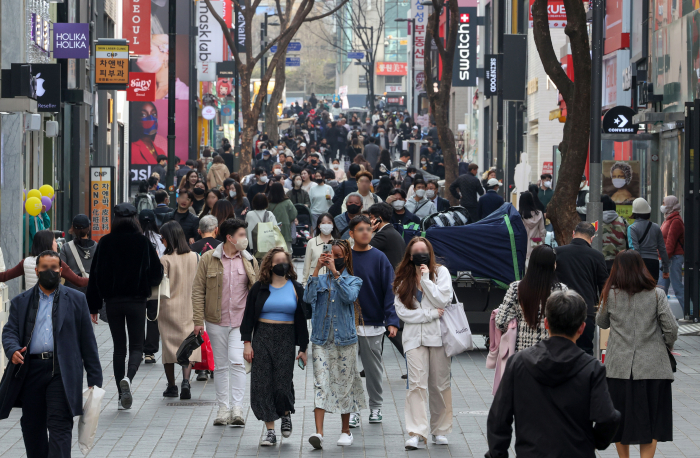Retail
Chinese shoppers slash online purchases of Korean goods
By contrast, South Koreans' spending via Chinese e-commerce platforms doubled in the first quarter
By May 02, 2023 (Gmt+09:00)
1
Min read
Most Read
LG Chem to sell water filter business to Glenwood PE for $692 million


KT&G eyes overseas M&A after rejecting activist fund's offer


Mirae Asset to be named Korea Post’s core real estate fund operator


StockX in merger talks with Naver’s online reseller Kream


Meritz backs half of ex-manager’s $210 mn hedge fund



Chinese shoppers have slashed online purchases of South Korean goods since the outbreak of the COVID-19 pandemic, tightening their wallets mostly on cosmetics, better known as K-beauty products.
By contrast, South Koreans have bumped up their shopping through Chinese online malls for cheap clothes and electronics goods, data showed.
In the first quarter of this year, Chinese consumers led a 49.4% plunge to 287.1 billion won ($214 million) in cross-border sales of Korean e-commerce platforms from a year earlier, according to Statistics Korea on Monday.
Chinese made up 53% of their overseas shipments, with cosmetics taking a 92% share.
Particularly, they cut back on spending for duty-free items in the first quarter on the back of travel restrictions during the pandemic period. Duty-free goods took the bulk of South Korean online malls’ cross-border sales.
Compared to the first quarter of 2020, the latest figure represented an 81.7% plunge from 1.53 trillion won.
By sales item, Chinese shoppers' online purchases of Korean cosmetics dwindled 60.6% on-year to 140.6 billion won, or less than one-tenth of the 1.26 trillion won they spent in the first quarter of 2020.
For offline shopping, a majority of Chinese travelers' top picks in South Korea are cosmetics and perfume, a recent survey by the Korea Chamber of Commerce and Industry (KCCI) found.

South Koreans' online purchases of foreign goods climbed 16.6% on-year to 598.4 billion won in the first quarter.
By country, their spending through Chinese e-commerce platforms doubled to 655 billion won from 328.5 billion won the previous year.
China overtook the US as home to their favorite foreign online shopping malls for South Koreans for the first time since the relevant data began to be compiled in 2014.
Japanese online malls also enjoyed a 29.4% jump in first-quarter shipments to South Korea.
Among Chinese shopping platforms, Taobao accounted for 11.7% of South Koreans' online purchases in 2022, followed by AliExpress with 8.5%, according to the Korea Customs Service. Both are owned by Alibaba Group, China’s e-commerce leader.
Write to Jeong-Soo Hwang at hjs@hankyung.com
Yeonhee Kim edited this article.
More to Read
-
 Travel & LeisureChinese buy cosmetics, Japanese pick groceries in Korea: Survey
Travel & LeisureChinese buy cosmetics, Japanese pick groceries in Korea: SurveyApr 26, 2023 (Gmt+09:00)
2 Min read -
 Beauty & CosmeticsKorean cosmetics shares rise as China reopens borders
Beauty & CosmeticsKorean cosmetics shares rise as China reopens bordersJan 11, 2023 (Gmt+09:00)
1 Min read -
 Beauty & CosmeticsCosmetics shares rally amid hopes of eased social distancing
Beauty & CosmeticsCosmetics shares rally amid hopes of eased social distancingMar 27, 2022 (Gmt+09:00)
1 Min read
Comment 0
LOG IN


